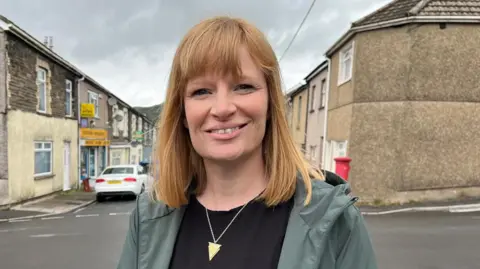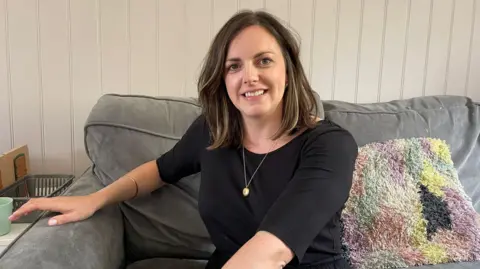Concerns some Welsh-language nurseries could close
 BBC
BBCThere are concerns that some Welsh-language nurseries could face closure if more demands in the childcare sector fall on the shoulders of fewer volunteers.
At present, hundreds of Cylch Meithrin nurseries across Wales are run by volunteer committees who are part of the Mudiad Meithrin network.
But with increased financial, safeguarding and staffing demands, many volunteers have said the current arrangements are not fit for purpose.
Mudiad Meithrin have said its options were limited, since each Cylch was an independent charity.
The chief executive added that they "don't have a magic wand to fix things overnight", but that they had not seen evidence of a reduction in volunteers.
Cylch Meithrin Cilfynydd in Pontypridd opened following efforts by local parents, who were concerned about the effect closing Ysgol Pont Sion Norton would have on Welsh-medium education in the village.
Within a few years, however, the Cylch had closed.
"There were three of us volunteers, without expertise in childcare," said Lowri Real, the Cylch's former secretary.
"Finding a site was one challenge, staffing was a huge challenge, and trying to ensure that the business was sustainable.
"But unfortunately, with staffing and site costs it was just impossible to run it viably. The three of us were essentially running a business on goodwill alone."
They were encouraged by the Mudiad Meithrin to apply for grants from the Flying Start scheme, but that would have meant offering more childcare hours and so more admin work.
"That was beyond our means as a small committee," said Ms Real.
She added that it was frustrating not to be able to continue with what they had been offering.
"If we don't look again at the system, I worry about small communities like this who will lose the language," she said.
"We need to come round the table and look at this, because the system isn't working and isn't sustainable.
"I wouldn't be encouraging anyone to open a Cylch Meithrin, because it has been heartbreakingly difficult."

Two years ago, Cylch Meithrin Pontrhydfendigaid in Ceredigion was recognised as the top nursery in Mudiad Meithrin's annual awards.
But maintaining that high standard was a challenge said Gwawr Evans, chair for the past five years.
"It's a lot more work than I'd thought," said the mother of four, who also runs a business.
"It's been an eye-opener seeing how much the committee does for the Cylch."
The Cylch had secured grants to pay for a staff member to do admin work, but Ms Evans said more practical help from Mudiad Meithrin would be welcome.
"The Mudiad does great work, but more help for committees to deal with reports and staff assessments would certainly be welcome."
She was worried that fewer people would want to volunteer in the future.
"I think it would be a challenge to find anyone willing to take over as chair, treasurer, secretary.
"No one wants to do it because they see how much work it takes.
"People have so much more going on with children, work, looking after the house.
"I'm worried about the nurseries' futures, and how they're going to be run, if more people aren't coming through."
'Parents want more childcare provision, not less'
Mudiad Meithrin's chief executive Dr Gwenllian Lansdown Davies said she was aware of the pressures on volunteer committees, given the high standards of the childcare sector.
Mudiad Meithrin will now review the voluntary committee model to see whether there were other alternatives.
"The advantage of a volunteer model is that the Cylch belongs to the community," she said.
"But of course, as childcare demands become ever more complex, the demands on committees also increases.
"We have a responsibility as Mudiad to take stock of that, and think what can we do differently, while accepting that we don't have a magic wand that can fix things overnight."
Mudiad Meithrin said it was always looking for ways to relieve pressure on volunteer committees.
It added that although it was impractical for all nurseries to be part of the Flying Start scheme, many parents were now looking for all-day childcare rather than a few mornings a week.
The number of Cylchoedd Meithrin providing Flying Start has more than doubled to 44% over the last three years.
"Communities and parents on the whole want more childcare provision, not less," said Dr Davies.
"The concern is if it's not being provided in Welsh, that we'll lose children from the Welsh-medium sector to the English-medium sector."
Although Mudiad will look at alternative models, Dr Davies said there was no evidence so far that workload concerns were putting people off joining committees, or setting up new Cylchoedd Meithrin.
"We have more individuals volunteering on the committees this year than last year, but that doesn't mean we aren't aware of the pressures on them," said Dr Davies.
"The important thing is that we work in partnership with our 1,200 volunteers and say, if there's something we can do differently or better, then we should do that together."
In response, the Welsh government said it greatly values the role childcare settings play in giving children across Wales "the opportunity to play, learn and grow".
"We provide local authorities and Cwlwm partners with funding for childcare and play which includes supporting the sustainability and promotion of Welsh Medium provision," it added.
"Local authorities must assess childcare provision in their areas. We are currently reviewing this process so challenges in childcare provision can be addressed."
